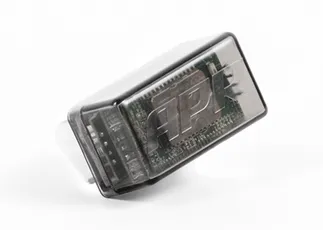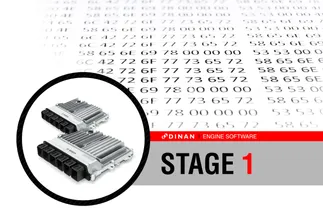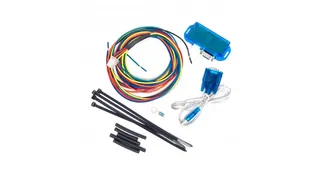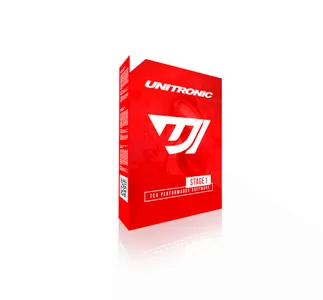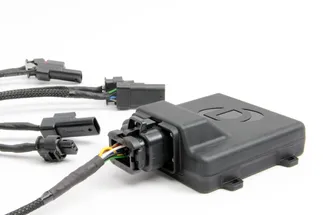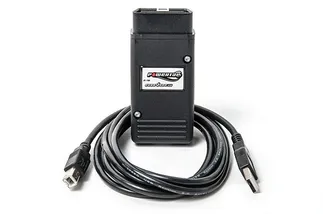Product Information
APR Plus DSG Software For All DQ250 MQB Cars (1.8T and 2.0T)
ALL APR PLUS SOFTWARE MUST BE DONE LOCALLY AT USP (South Florida)
APR is pleased to present the ultimate transmission control unit (TCU) upgrade for the DQ250 DSG and S Tronic transmission!
APR’s TCU Upgrades are the best modifications one can make to the DSG or S Tronic transmission. The upgrade allows the transmission to hold higher torque levels with faster acceleration and quicker shifts. Each driving mode is optimized for the higher power levels provided by APR’s engine upgrades. The upgrade allowing the end user to customize launch control and manual mode to their liking, and adds various features only found on higher end vehicles!
Applicable Vehicles (DQ250 Transmission):
- Audi A3 2.0T (8V) - 2014-2020
- Audi A3 1.8T (8V) - 2014-2020
- Audi S3 2.0T (8V) - 2014-2018
- Audi TT 2.0T (MK3) - 2016-2018
- Audi TTS 2.0T (MK3) - 2016-2018
- Volkswagen Golf R 2.0T (MK7) - 2015-2017
- Volkswagen GTI 2.0T (MK7) - 2015-2018
- Volkswagen Golf Sportwagen 1.8T (MK7) - 2015-2018
- Volkswagen Alltrack 1.8T (MK7) 2016-2018
At Home APR Flashing - How does it work?
USP Motorsports has made at home APR Software as easy as 1, 2, 3...
1. Purchase the software applicable to your vehicle (this page)
2. Purchase the required hardware (APR Cheetah Cable) - Links below
3. Complete the form that will be emailed to you after checkout. This will arrange all the necessary steps to complete the flashing process.
Required Hardware: APR Software Flashing Cheetah Cable (Get Up to 80% back of what you paid for this*)
Recommended Hardware Kit: APR At Home ECU/TCU Flashing Kit (This kit includes the cheetah cable above)
After checkout, you will receive an email from USP Motorsports with instructions on how your ECU/TCU can be flashed.
NOTE: This software must be purchased along with a required APR Software Flashing Cheetah Cable. (Note: We highly recommend getting the complete APR At Home ECU/TCU Flashing Kit to avoid any potential issues during the flashing process)
Feature List
- Faster Acceleration: Increased clamping pressure, optimized shift points, and better launch control all result in faster acceleration.
- Quicker Shifts: Increased clamping pressure and optimized shift times result in a faster shift under various scenarios.
- Optimized Shift Points: Drive mode is optimized for fuel economy while sport mode is optimized for faster acceleration with APR’s various hardware and software upgrades.
- Increased Clutch Clamping Pressure: Increased clutch clamping pressure beyond factory torque levels to support higher output.
- Smoother Daily Driving: Optimized part throttle / daily driving shift maps to provide a smoother and more enjoyable driving experience.
- User Definable 3-step Launch Control: Launch control is enabled on all models, with ESP on or ESP off. Three user-defined launch control RPMs are set at the time of install. Launch control response is also optimized for faster engagement and stronger take-off.
- User Definable Manual Mode: The automatic manual mode upshift and kick-down switch downshift can be enabled or disabled at the time of install.
- Raised Torque Limiters: Non-physical transmission torque limits are raised to allow for higher output while retaining critical protection limits.
- Downshift Lockout Optimized: Manual downshifts are permissible in all gears so long as the next gear is below redline.
- Temperature Management Optimized: Allows for limited torque during over-temp conditions vs total immovability.
- Gear Display Activated: Shows the current gear in the factory multi-functional display in both drive and sport mode.
- DirectPort Programming: The TCU Upgrade installs in minutes without opening the TCU and can be uninstalled at any time.
APR TCU Upgrade Included Feature Details
Increased Clutch Clamping Pressure
APR’s Calibration Experts have recalibrated the transmission to continue increasing clamping pressure when clutch slip is detected. The transmission constantly monitors for clutch slippage and adjusts clamping pressure such that the minimum amount of pressure is applied to prevent slip. This ensures clutch engagement remains comfortable under most driving scenarios. Unfortunately, this function is limited in its abilities. As such, clutch slip can occur when increasing torque. This often leads to overheating warnings, which are further exacerbated by low transmission fluid levels. APR’s TCU Upgrade reconfigures the clamping pressure routinely continue increasing clamping pressure to match the higher output from APR’s various performance upgrades. Pressure steadily increases, preventing slip, but remains below maximum protection levels defined by the factory TCU.
On a healthy transmission, the result is easy to feel as it transforms the transmission. Expect crisper and faster shifts at wide-open-throttle, faster clutch engagement during takeoffs and launch control, higher max torque levels, more consistent back-to-back results, and faster acceleration!
Drive Modes - Drive (eco) and Sport Mode
APR’s calibration experts found the factory drive and sport modes to be less than ideal when raising power above the factory limits. In drive mode, the transmission aggressively seeks sixth gear, earlier than necessary, leaving behind an anemic and lack luster experience for the driver. Likewise sport mode leaves a lot to be desired considering its seemingly exciting name. Under both modes, maximum shift points remain optimized for the factory power levels, which vary greatly to those produced using APR’s world-renowned catalog of performance hardware and software. As such, accelerative performance suffers due to non-optimized shift points.
To rectify this situation, APR’s engineers took a multi-step approach to custom tailoring the shift maps to sync harmoniously with APR’s performance upgrades and each platform’s gear-ratio configurations. While some may simply set wide-open-throttle, or WOT shift points to the vehicle’s max RPM limit, APR’s engineers chose shift points based on actual acceleration data. This result is gear dependent shift points typically below the engine’s max speed, but in doing so, the vehicle’s acceleration improves as axle torque is matched before and after shifts.
Under low-torque, low-rpm, part-throttle situations, both modes less aggressively seek the highest possible gear. Drive still has the benefit of the economy, but stays within the power band more comfortably for a more enjoyable experience. Likewise, sport mode has been optimized to provide a sporty feeling, worthy of its name. In both cases, the transmission seamlessly integrates with APR’s performance upgrades to provide an exciting driving experience.
Manual and Tiptronic Modes
APR’s user-definable options allow the end-user to configure how the transmission works while the gear selector is placed in manual mode.
The kick-down switch, which is responsible for an instant downshift, is enabled by default but can be disabled at the time of install. Likewise, the auto upshift that occurs at the vehicle’s maximum engine speed can also be disabled at the time of install, allowing the engine to bounce off the limiter like a manual transmission.
The transmission does not lock out any manual downshifts so long as the shifting does not result in an engine RPM above the max shift point. In all situations, paddle delay is reduced, allowing for a more responsive shift to take place and furthermore, manual shift times have been optimized.
APR Plus TCU (Sold separately) Upgrade Notice: APR Plus TCU Upgrade retains the factory auto upshift and auto downshift behavior.
Launch Control
APR’s 3-Step launch control is unlike anything else in the market. At the time of flashing, the user chooses a maximum launching RPM. When activating launch control, up to three launching RPM’s are available, allowing the end-user to choose the best launching RPM based on the current conditions!
At 100% throttle with the kick-down switch engaged, the vehicle will select the highest launching RPM. At 100% throttle with the kick-down switch not engaged, a lower launching RPM is activated. Finally, at roughly 50% throttle the transmission chooses the lowest launching RPM. When properly dialed in, the user is left with incrementally higher launch points ideal for the street, track, and sticky tires.
Utilization of launch control results in the transmission entering the maximum acceleration mode. During this mode, intervention between a shift is minimized, resulting in faster acceleration that keeps the driver planted to the back of his or her seat. The delay typically present after lifting the brake and beginning of the physical launch has been improved for a more immediate response, while also physically speeding up the application of torque at the onset of the launch.
Launch control is enabled for use with ESP on or off, allowing the end-user to experiment with launching techniques depending on tire setup, surface conditions, drivetrain and overall vehicle setup. ESP is most favorable on front-wheel drive vehicles, especially in poor conditions, to help control wheel spin during a launch. Furthermore, torque ramp rates were adjusted to help prevent excessive wheel spin, and subsequent first gear short-shifting on all-wheel drive vehicles.
Recommendation: APR does not advise setting the launch limiter higher than 4,000 RPM. When using launch control, excessive wheel spin will not improve acceleration and may cause undesirable behavior. APR suggests using lower launch limits under low grip situations, especially on FWD vehicles. A higher launch RPM is only ideal with drag slicks / radials on a well-prepped drag strip.
Temperature Management
Temperature management is an important part of the DQ250 transmission. While some may simply remove temperature protection routines altogether, or mistakenly raise temperature protection torque limiters sky high and claim increased cooling performance due to zero transmission intervention, APR’s TCU upgrade only allows the maximum safe temperature levels before intervention.
Unlike the factory intervention routine, which allows for nearly no torque to be transmitted through the transmission at all after limits are crossed, APR’s over temp intervention allows for a limited amount of torque, enough so the vehicle can be safely driven off the track or pulled to the side of the road during intervention. In keeping the vehicle moving, airflow continues across the radiators, which in turn keeps coolant temps low and aids in removing heat from the factory DQ250 oil coolers to restore full operation.
Torque Limits
Various factory torque intervention limiters are raised to their maximum value to eliminate unintended torque intervention, across the rev range, during normal and spirited driving. However, important and critical limiters are kept in place or only slightly modified, such as those related to temperature protection, to prevent premature damage to the transmission in dangerous scenarios.
Gear Display Indicator
In drive (eco) and sport mode, the vehicle’s multi function display will now indicate the currently selected gear rather than a generic D or S.
The APR Way
APR DirectPort Programming:
APR’s DirectPort Programming is now available for the Temic Tricore DQ250 transmissions. Any APR Dealer in the world, connected to the Internet, has direct access to APR’s latest TCU upgrades for installation directly over the vehicle's OBD-II port. This completely eliminates the need to remove and open the TCU and can be uninstalled at any time!
APR TCU Upgrade Creation:
APR’s engineers have taken a direct and custom approach to calibrating the TCU. All too often others create a generic calibration that is forced across a wide range of different vehicles and transmission versions. Unfortunately this generic method of copy and paste tuning can result in some undesirable effects, such as slow up shifts and downshifts, torque interventions, stumbling, immobility and general incompatibility. In some extreme cases, damage to the transmission can occur. With many factory TCU variations available for the transmission, APR’s engineers have painstakingly ensured every TCU upgrade is created using the transmission’s original file to ensure the ultimate experience!
APR TCU Composer:
APR’s proprietary TCU Composer is used for altering the transmission management system. With full access to every table, map and variable within every TCU, APR’s Calibration Engineers are not limited to the handful of pre-defined maps.
APR TCU Assembly:
APR’s Electrical Engineers have the ability to alter the code structure of the TCU. Through code-level changes, APR's Engineers are able to add future features to the TCU otherwise impossible through calibration changes alone.
- Stage 1 or 2 Back to Stock: APR ECU Flash Back to Stock Tune (Engine)
- Transmission Tune Back to Stock: APR TCU Flash Back to Stock Tune (Transmission)
- Stage 1 or 2 & Transmission Back to Stock: APR ECU & TCU Flash Back to Stock Tune (Engine and Transmission)

